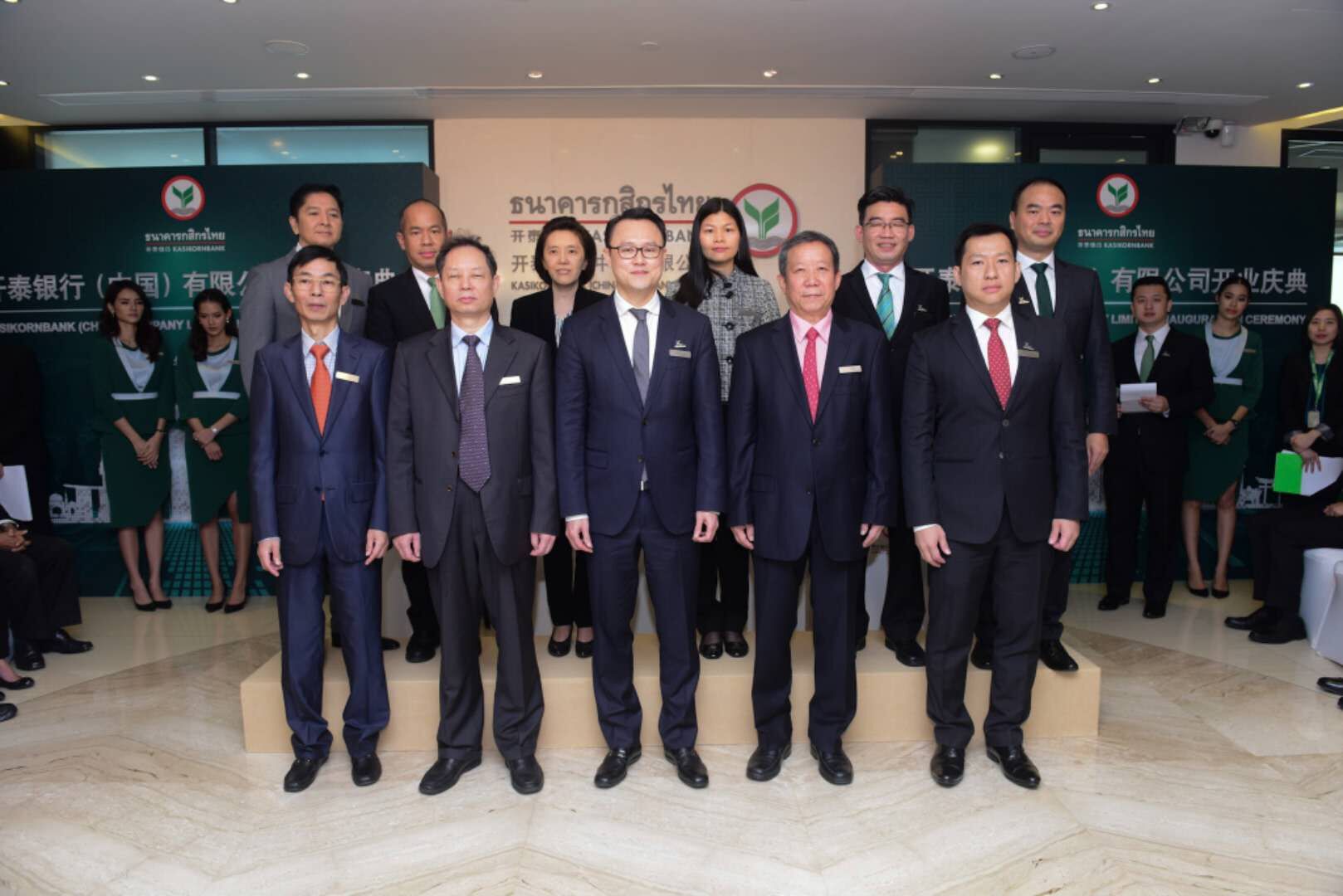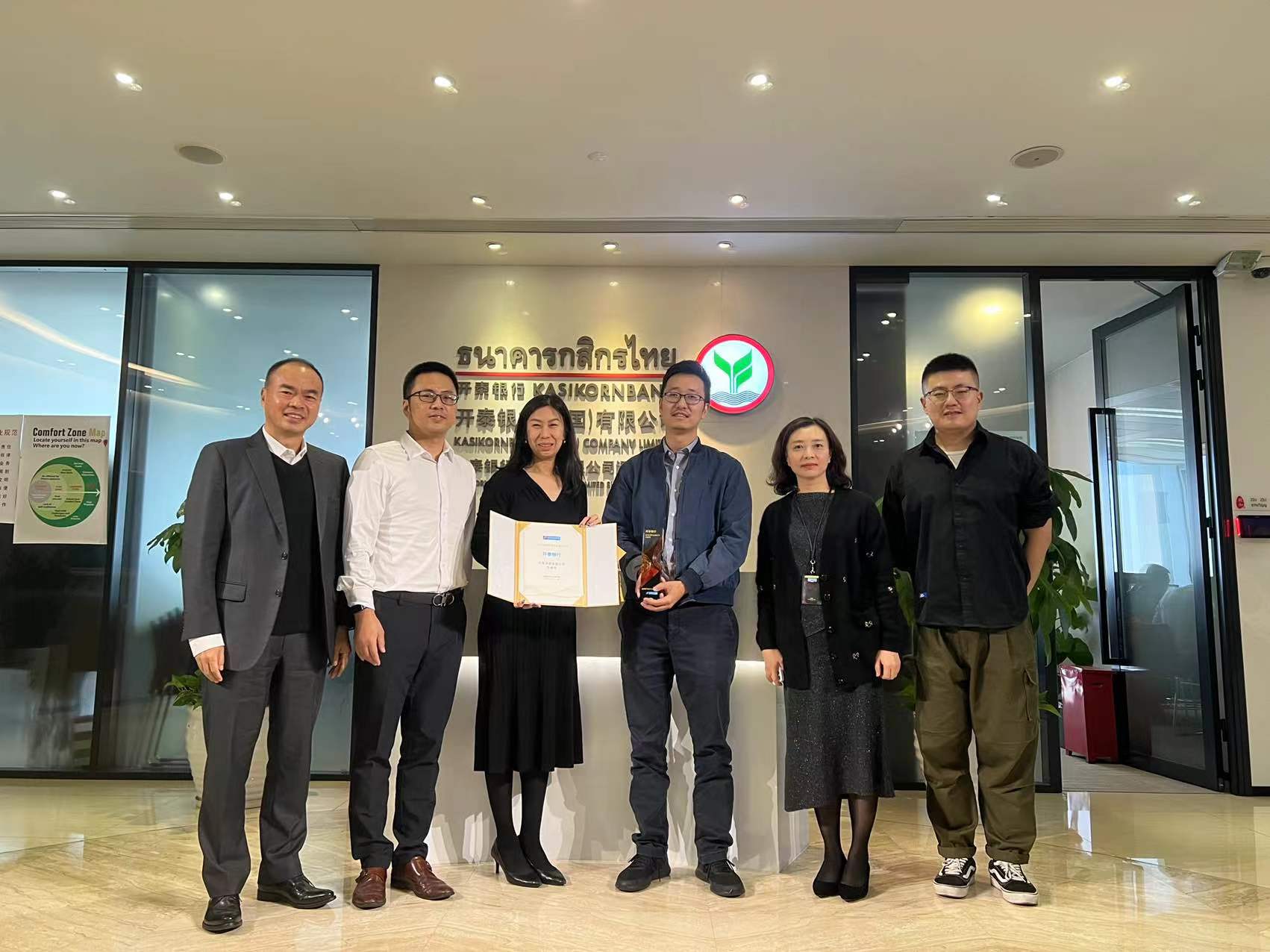About KBank Home > About KBank > News Center > Bank News
 Back
Back
-
Kasikornbank (China) Company Limited operates business in Luohu, Shenzhen, promoting the AEC+3 digital banking strategy and connecting the enterprises in China-ASEAN
2017-12-01 13:42:20

KASIKORNBANK (KBank) has been granted a license as a locally incorporated institution (LII) by China’s regulatory agency. With their headquarters in Shenzhen and a branch in Shanghai, KBank service will be enhanced to support flourishing trade and investment in China, which is expected to become an even greater economic power over the next decade. Focus will be placed on businesses involved in trade and investment with China, Thailand and ASEAN, and on economic connectivity within the AEC+3 region (AEC plus China, Japan and South Korea). As a “Digital Bank of AEC+3”, KBank aims to achieve total loans of THB29 billion and cross-border transactions amounting to THB150 billion in 2018, rising 30 percent YoY and 40 percent YoY, respectively.
Mr. Banthoon Lamsam, KBank Chairman of the Board, has said that China’s economy is now the second largest of the world, and thus is a key driver of global economic growth. Their economic size accounts for approximately 15 percent of the global economy, having seen growth of 6.8 percent YoY in 3Q17. In 2018, it is expected that China’s economic growth will be at least 6.7 percent YoY. Now into their 13th Five-year Economic and Social Development Plan, China is working toward becoming the world’s most innovative country and largest financial hub.
As prescribed by their 13th 5-year plan, a “Made in China 2025” policy is underway to guide the country toward increasing their innovation and technological competitiveness via upgrades in value chains and promotion of their “Made in China” brand globally. Innovation and cutting-edge technologies will be employed to add value to manufacturing outputs, e.g., in the electronics, IT, hi-tech and fintech fields. Although there are only eight ‘fintech unicorns’ (startup companies with a value of more than USD 1 billion) in China, compared to 12 in the US, their total value has risen to over USD964 billion, Thus making them the most valuable fintech unicorns in the world.
The China Banking Regulatory Commission (CBRC) awarded KBank a permit to set up a Locally Incorporated Institution (LII) under the name of ‘Kai Tai Yin Hang (Zhong Guo)’, or KASIKORNBANK (China) Co., Ltd., with their headquarters in Shenzhen, Guangdong Province, and a service network comprising the Shenzhen Branch, Longgang Sub-Branch, Chengdu Branch, Shanghai Branch, Hong Kong Branch, Beijing Representative Office and Kunming Representative Office. This LII license allows KBank to more rapidly expand branches, upgrade representative offices to branches, and in the future, offer more comprehensive services to both corporate and retail customers. This achievement in licensing is thus a major step toward KBank’s expansion into the huge China market that has shown remarkable growth and high domestic purchasing power. Under China’s development plan, there will likely be promising business opportunities for KBank’s corporate and retail clients, e.g., with the “One Belt, One Road” policy and a national policy to create greater prosperity for the Chinese population.
The “One Belt, One Road” policy is aimed at enhancing business links between China and the AEC, within which a number of large infrastructural projects are now under construction in the region, leading to demand for financing and investment outside of China. The 19th National Congress of the Communist Party of China concluded that, under the 13th Economic and Social Development Plan, higher incomes for the Chinese people will be emphasized, focusing on structural reforms related to supply, innovation and advanced technology, as well as an expansion of the service sector’s share of their total economy. This plan is therefore aimed at transforming China’s economy into a consumption-led market, versus an export manufacturing-based foundation now. With their middle-class population growing from 300 million now to 700 million by 2020, the consumer finance market will expand significantly, and Chinese investments abroad will rise, as well.
This LII license will serve as a means for KBank to enlarge their network in response to buoyant business opportunities there, per government policies. More comprehensive customer service will lead to a larger array of business services, for example, leasing and insurance.
Shenzhen, a city known as the “Asian Silicon Valley”, is not only home to KBank (China) headquarters, but also many fintech unicorns. KBank is therefore well-placed to co-operate with the development of new innovations, and will join hands with technology and fintech companies to develop even better digital banking platforms to link KBank (China) services with those of KBank Thailand and other ASEAN states. With this goal, KBank will rise to become an AEC+3 settlement hub.
Apart from the LII license, KBank has been permitted to open a third branch in Pudong District of Shanghai, which is one of China’s largest financial hubs and will be a major global financial hub in the future. This branch is located in the Shanghai Free Trade Zone, having trade transactions with ASEAN totaling USD92.2 billion in 2016 – 21 percent of the total SINO-ASEAN trade value. Shanghai investments into Thailand and ASEAN have been on the rise, especially over the past few years. Through the Shanghai Branch, KBank will be able to expand their customer base in Shanghai as well as in other locales such as Zhejiang Province, Jiangsu Province and Shandong Province. Initially, the Shanghai Branch will mainly serve Thai and Chinese corporate customers engaging in trade between China and ASEAN, as well as Chinese corporate customers seeking to invest in Thailand.
Mr. Banthoon added that many Chinese businesspersons are interested in the AEC, in alignment with China’s 13th Economic and Social Development Plan and their “One Belt, One Road” initiative. Thailand is located at a strategically convenient geographic point well-suited to being an investment base. Other attributes include Thailand’s structural efficiency and government support policies. For example, the Thailand Eastern Economic Corridor (EEC) policy is aimed at enhancing the manufacturing potential of the Eastern Seaboard linked with AEC markets. During 9M17, the aggregate value of Sino-Thai trade exceeded USD59 billion (compared to USD77 billion overall in 2016), with over 25 percent, equal to USD14.5 billion, generated with Guangdong.
On the occasion of KBank has been granted a license as a locally incorporated institution (LII), Guangdong Department of Commerce and KBank signed a Memorandum of Understanding to enhance cooperation and facilitations for Guangdong businesses interested in Thailand as an AEC trade base, as well as for Thai businesses interested in Southern China, which is already an important commercial focus for Thailand.
Mr. Zheng Jianrong, Director-General of the Department of Commerce of Guangdong Province, mentioned that Guangdong and Thailand have deep ties. With respect to investments, Guangdong investments are already large at over USD390 million. In terms of cultural links, 79 percent of all Thais having Chinese descent are of Teochew lineage from Guangdong. Collaboration between Thailand and Guangdong is thus viewed as a step forward in Sino-Thai relations, thus creating an exchange for information and a network to advance trade and investment between them.
Mr. Banthoon concluded that KBank is well aware of the importance of their business, trade and investment links within the region. Being a bank may not be enough anymore, he believes; but being a business partner of the AEC+3 will create great opportunities for customers. Added to KBank’s financial facilities are their advisory services toward investment and business matching that will help upgrade the regional business efficiency of KBank’s customers. KBank’s regional service network in the AEC+3 and other countries include two LIIs, one in China and one in Lao PDR (with headquarters at Shenzhen and Vientiane, respectively); seven overseas branches in Shanghai, Chengdu, Hong Kong, Longgang (Sub-Branch), Phnom Penh, Ban Ponesinuan and Cayman Islands; plus eight representative offices in Beijing, Kunming, Yangon, Hanoi, Ho Chi Minh, Jakarta, Tokyo and Los Angeles, totaling 17 venues.




















 WeChat Official Account
WeChat Official Account




